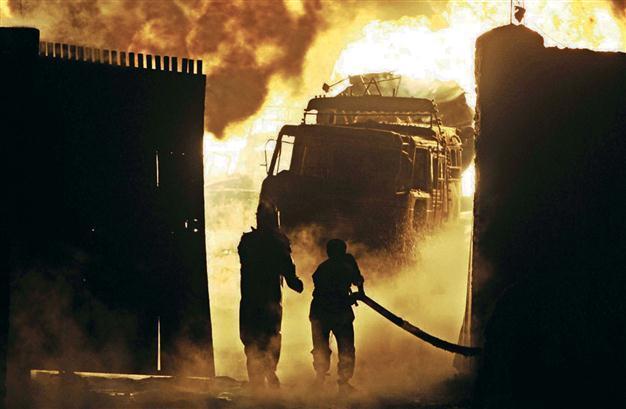Pakistan puts US on the spot with tight measures
ISLAMABAD / QUETTA

Pakistani firefighters try to extinguish burning NATO supply oil tankers. Gunmen attack NATO oil tankers stranded in southwest Pakistan for the second time in recent days. AFP photo
Pakistan’s blockade of the U.S. supply line into Afghanistan, ordered in retaliation for a border strike, is likely to stay in place for weeks, Prime Minister Yousuf Raza Gilani told the BBC. The statement comes as gunmen attacked NATO oil tankers stranded in southwest Pakistan for the second time in days.“We want to set new rules of engagement and cooperation with the United States. We have a resolve to fight against terrorism and therefore we want to set new rules of engagement,” Gilani said, adding that there was still a “credibility gap” with the U.S. “We are working together and still we don’t trust each other. I think we have to improve our relationship.” The ban, already in its third week of the longest closure of the 10-year war, would not be lifted until new “rules of engagement” were agreed upon with Washington, Gilani said, adding that it would be a matter of “weeks,” not days.
Gilani stood by Pakistan’s declaration that the border incident was a pre-planned attack, an allegation Washington rejects. “Still there is an internal inquiry being conducted, and we are waiting for the results,” he said, adding that the motive for such a deliberate attack remained “a big question mark,” Agence France-Presse reported.
U.S. President Barack Obama telephoned President Asif Ali Zardari to offer his condolences over the strike, but Washington has stopped short of apologizing pending the outcome of a military probe due Dec. 23. Although Pakistani and U.S. officials dispute the precise sequence of events, Pakistan closed its two crossings to U.S. and NATO supplies and ordered U.S. personnel to leave an airbase reportedly used by CIA drones against the Taliban and al-Qaeda.
NATO convoy set ablaze again
Meanwhile, gunmen attacked NATO oil tankers stranded in southwest Pakistan for the second time in recent days. The attackers shot dead a driver and destroyed seven tankers in a blaze Dec. 11, the second attack in four days in Pakistan’s volatile region of Baluchistan, which is rife with separatists and Taliban militants.
On Dec. 8, gunmen destroyed at least 34 trucks in a firearm and rocket attack at a temporary NATO trucking terminal in Quetta. The Taliban have in the past said they carried out such attacks to disrupt supplies for the 140,000 U.S.-led international troops fighting in Afghanistan.
The U.S. on Dec. 11 also vacated a Pakistani airbase in Baluchistan. The Pakistani military said the last flight carrying U.S. personnel and equipment left Shamsi on Dec. 11 and they had taken over the base, Associated Press reported. The U.S. ambassador said previously the U.S. would do everything it could to vacate the base by the deadline.
ISLAMABAD DENIES TALKS WITH TALIBAN
ISLAMABAD
















